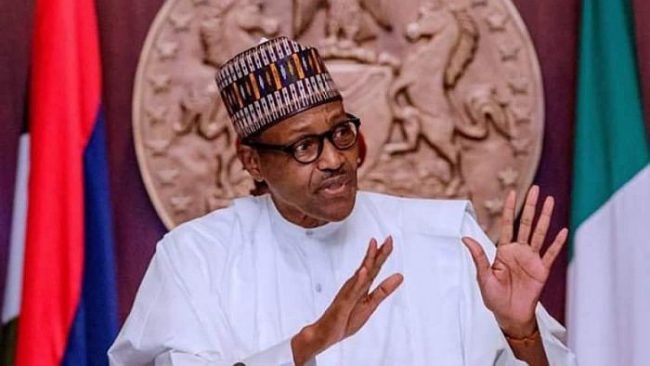President Muhammadu Buhari had, on Thursday, submitted a reviewed 2020 Appropriation Amendment bill for consideration and approval by the Senate.
The reviewed budget stands at N10.51 trillion naira from the earlier 2020 Appropriation Act with a total sum of N10.59.
The new budget has an entirely new provision for a national response to the COVID-19 pandemic amounting to N100.3bn.q.
Also presented to the Senate for revised 2020-2022 Medium Term Expenditure Framework and Fiscal Strategy Paper (MTEFFSP) for consideration of the Senate.
President Buhari said it has become imperative to carry out the adjustment in the 2020 Appropriation Act passed in December by the National Assembly to make for fiscal predictability, especially by businessmen and investors.
Buhari noted that the disruptions by the COVID 19 pandemic which cut across global economy made it necessary to review the budget in a manner that the administration can use it as a tool to mitigate challenges of the pandemic to the nation’s economy.
The letter dated May 19 and addressed to the President of the Senate, Ahmad Lawan, reads in part: “It is with pleasure that I forward the revised 2020-2022 Medium Term Expenditure Framework and Fiscal Strategy Paper (MTEFIFSP). and the revised Appropriation Bill 2020. for the kind consideration and approval of the Senate.
“Let me seize this opportunity. to express my deep gratitude for the patriotism. cooperation and support of the Leadership and Distinguished Member of the Senate in our collective efforts to amend the Appropriation Act 2020 and accelerate its implementation.
ALSO READ: NYSC to convert skills’ acquisition centre in Gombe to school ― DG
“It is necessary to reallocate resources in the Appropriation Act 2020, to ensure effective implementation of required emergency measures. and other actions necessary to mitigate the negative socioeconomic effects of the COVlD-19 Pandemic.”
He appealed to the Senate to ensure an expeditious legislative action given the urgency of the task to boost the economy.
Responding to the urgency in the letter, the Senate considered the revised 2020 Appropriation bill and the Fiscal Strategy Paper and tasked its committee in Appropriation to work the document and report back on Tuesday.
However, in the lead debate by the Leader of the Senate, Senator Abdullahi Yahaya, said: “all the proposals in this Revised 2020 Appropriation Bill, are laudable and imperative to support economic activities and mitigate the diverse effect of the Covid-19 shocks as well as enhance the critical needs of the citizens of this county.”
This according to him was critical because realising the oil production of 2.18 million barrels per day and a benchmark oil price of $57 dollar per barrel and an exchange rate of N305 to a dollar has been disrupted by the pandemic.
The proposed parameters according to the President is that the 2020 Appropriation Act (Amendment) Bill is now predicated on oil production of 1.93 million barrels per day and a benchmark oil price of $35 dollar per barrel.
The official exchange rate has also been adjusted upwards to N360/US$1 by the Central Bank of Nigeria (CBN).
The aggregate revenue available to fund the 2020 budget is now projected at N5.09 trillion (35% or N278 trillion less than 2020 Budget passed by National Assembly). 26% of this projected revenue to come from oil-related sources while the balance is to be earned from non-oil sources.
Senator Yahaya in his lead debate pointed out that “The provision of Stamp Duty was reduced to N200 billion from M463.95 billion, while Signature Bonus is down to N350.52 billion from N939.30 billion. With the retained revenues of the ten major Govemment-Owned Enterprises (GOES), the aggregate FGN revenue is projected at N5.56 trillion.
“In order to forestall or at least slow down a decline into another recession, the Federal Government did not set out to implement austerity-style cuts in expenditure.
“However, in a bid to reprioritise government spending, some nonessential and deferrable expenditure (especially those classified as Administrative Capital Expenditure) were reduced in favour of growth-enhancing, pro-poor funding expenditures and social sector investments in order to combat the current Pandemic as well as its negative impacts on the economy.
“Deductions by NNPC for Federally Funded Upstream Projects/Expenditures have been significantly reduced by 65% from N1,223 trillion to N424.23 billion. These cuts include the removal of N457.50 billion provision for premium motor spirit (PMS) under-recovery, with the re-introduction of a Price Modulation Mechanism (tied to international price movement) as the basis for pricing PMS going forward.”
He continued that “The FGNs expenditure budget (including grants and donor funding) is estimated at N10.51 trillion (inclusive of project-tied loan financed projects and expenditures of ten GOES), down from N10.59 trillion in the 2020 Appropriation Act. Debt services are estimated at N2.68 trillion while provisions for sinking fund to retire maturity bonds to Local Contractors/ Creditors is N272. 9 billion. The provisions for Personnel and Pension cost was retained at N2.83 trillion and N536.72 billion respectively.
The revised budget captured “the sum of N25. 56 billion (representing 1% of the Consolidated Revenue Fund) has been provided for the Basic Health Care provision Fund. Other critical provisions such as N2273 billion for routine immunization in the Service Wide Votes and 1538114 billion for the Power Sector Reform Programme has been retained.
The aggregate amount available for the Capital Expenditures (exclusive of Capital in Statutory Transfers) in this reverse 2020 budget is N223 trillion.
Yahaya explained that following the outbreak of the Coronavirus Disease (Covid-19), and its rapid spin into a global Pandemic in 01 2020, there has been corresponding economic consequences.
He sits the situation led to a slow-down of global economic activities as most countries are on lockdown with movement only limited to essential goods or persons performing essential services. Correspondingly, international oil prices have plunged triggered by the Saudi-Russia Oil War and weakening global demand.
Further to the above, most of the assumptions underpinning the 2020 FGN Budget have had to be revised in the face of current realities, as Nigeria is vulnerable to the current global economic disruption caused by the COVID-19 crisis which has led to declining in Crude-oil prices and spikes in risk aversion in the global capital markets.
Prior to the outbreak of COVID-19 pandemic, the Nigerian economy had been characterized by wavering external sector and improving internal economic indicators.
He said over-dependence on oil revenue, constrained fiscal space, low foreign and domestic investments and declining foreign reserve made the economy disproportionately vulnerable to the twin shocks of crude oil price/ production collapse and a health crisis affecting negatively the informal sector which accounts for over half of Nigeria’s GDP.
He conveyed a development of concern to the Senate that “Nigeria’s foreign reserves have declined to USD 35.9 billion in March 2020 from USD 44.7 billion in April 2020. The decrease is largely attributable to the impact of the decline in crude oil receipts.”
‘The uncertainty and general decline in global economic activities caused by the Covid-19 Pandemic have further dimmed the prospect of reversing the downward trend in foreign portfolio investments (FPIs) in the Nigerian Treasury Bills (NTBs), also adversely impacted by the Covid-19 inspired flight to safety, represent the second-biggest source of dollar inflow into the country after crude oil. ”
According to him the new economic realities, following the revision of key macroeconomic parameter, projected oil revenues for 2020 have been significantly reduced.
This, Adjusted downwards also are non-oil revenue projections, including various tax and customs receipts. Additionally, the First-Line consisting of N1.264 trillion for MDAs, N100.3 billion for Covid-l9 Expenditures, N20 billion for Capital Component for the Special Intervention Programme, N274.85 billion for other Capital supplementation, N141.17 billion Capital Budget for Ten GOES, N42.96 for Donor Grant Funded Expenditures and N387.30 billion funded by Project-Tied Loans.
The Senate Leader said official exchange rate has also been adjusted upwards to N360/US$1 by the Central Bank of Nigeria (CBN). At the Importers and Exporters Foreign Exchange (IEFX) window, where the bulk of foreign exchange transactions are consummated, the exchange rate recently depreciated from about N360/ USS] in January 2020 to over N385/US$1.
He said while the CBN continues to make strenuous efforts to stabilize the exchange rate, it is generally expected that the Naira will suffer further devaluation as Nigeria is projected to lose about US$26 billion in oil revenues, its principal source of foreign currency.






